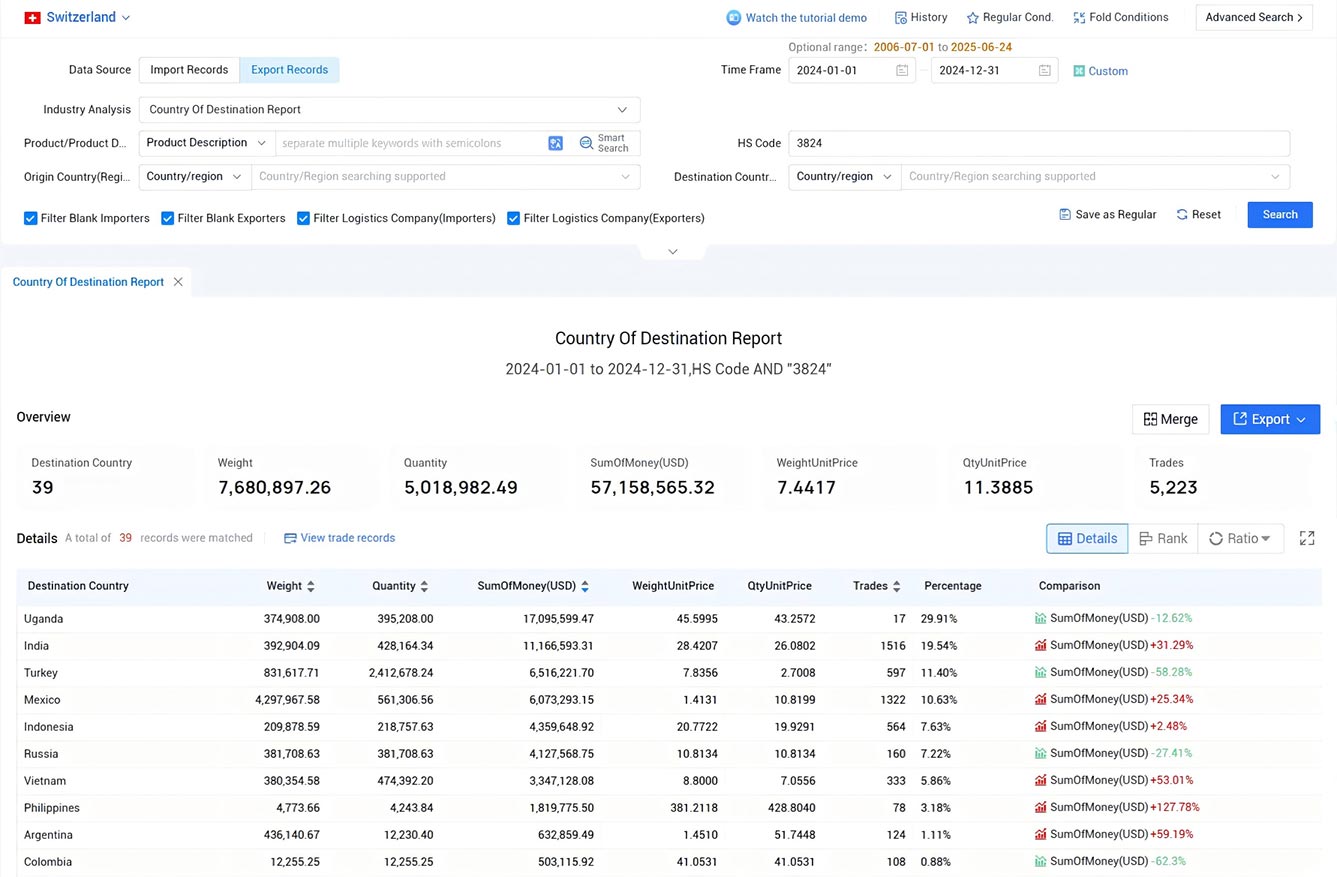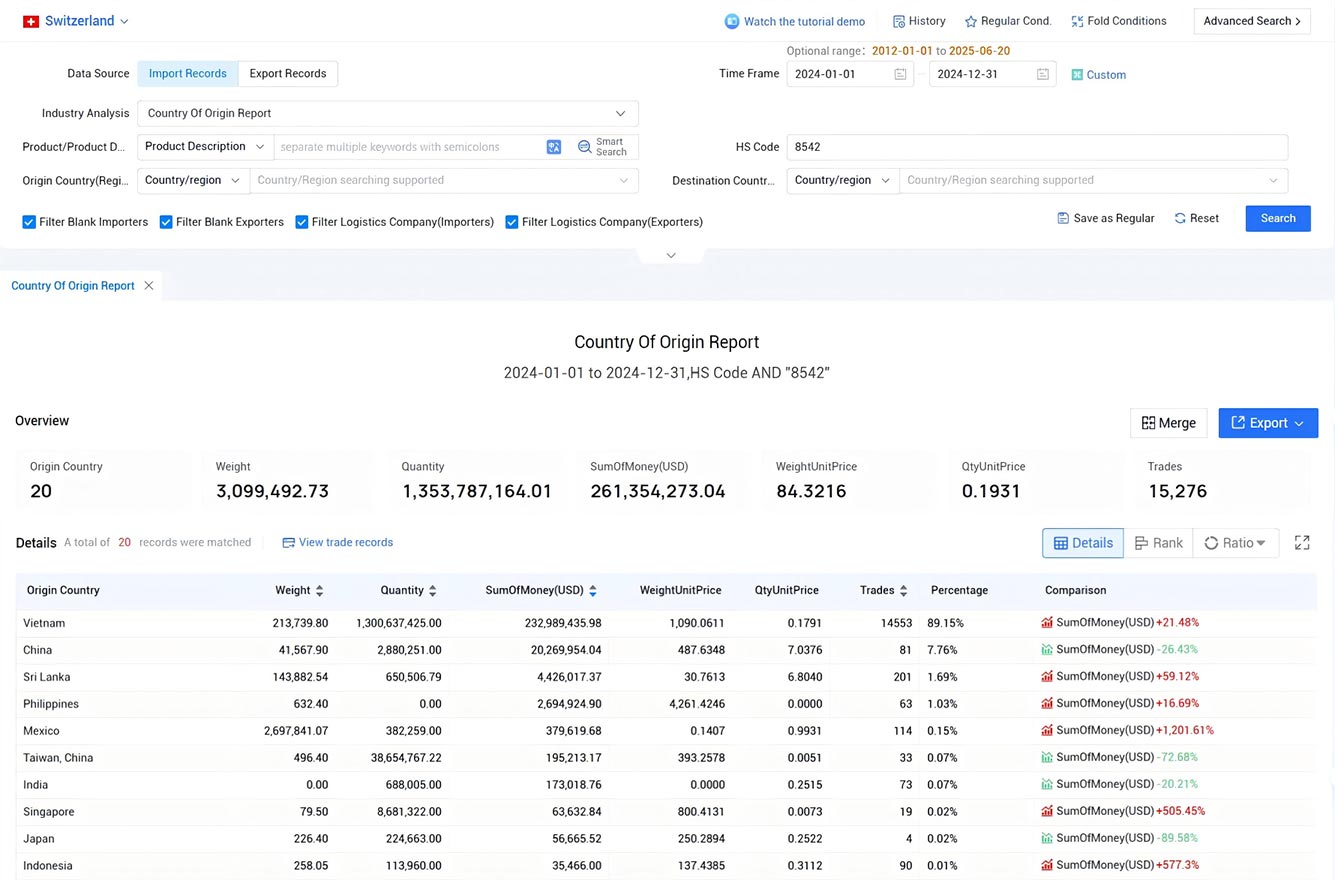 Trade Data
Trade Data
 2025-08-26
2025-08-26
For businesses and traders seeking to expand their reach or optimize their operations, access to Switzerland Trade Data can provide invaluable insights. With a comprehensive understanding of Switzerland's trade dynamics, companies can enhance decision-making, identify opportunities, and gain a competitive edge. Tendata explores how Switzerland trade data can unlock critical market intelligence, improve trading strategies, and drive business growth.
The Role of Switzerland in Global Trade
Switzerland may not be one of the world’s largest economies in terms of population size, but its strategic position and diversified economy make it a significant player in global trade. The country’s trade sectors span various industries, including:
Pharmaceuticals & Chemicals: Switzerland is home to global giants like Novartis and Roche, contributing significantly to its export economy.
Machinery & Precision Instruments: Known for its high-quality manufacturing, Swiss machinery, and precision instruments are in demand worldwide.
Financial Services: As one of the leading financial centers, Switzerland plays a critical role in facilitating international investment and trade.
Watches & Clocks: The Swiss watch industry is renowned for its precision, with luxury brands like Rolex, Patek Philippe, and Omega driving the nation’s exports.
Food & Beverages: Switzerland is home to multinational food companies like Nestlé, contributing to its diverse export portfolio.
With Switzerland Trade Data, companies can gain insights into these key industries, facilitating better market analysis and strategic planning.

How Switzerland Trade Data Benefits Businesses
Switzerland Trade Data provides a wealth of information that can help businesses make informed decisions, whether they are exporting, importing, or seeking to enter new markets. Key benefits include:
1. Comprehensive Market Analysis
Switzerland Trade Data is sourced from various official channels, including import and export declarations, bills of lading, and customs documents. This data offers a detailed look into the types of products traded, trade volumes, and values, as well as the countries involved in these exchanges. By analyzing these patterns, businesses can:
Identify which products are in demand in Switzerland and other markets.
Understand the dynamics of the Swiss export and import sectors.
Track trends over time to anticipate future market changes and opportunities.
>>>> Get Switzerland Trade Data <<<<<
2. Identifying Key Trading Partners
Switzerland’s international trade relationships are extensive, encompassing both European and global markets. With access to Switzerland Trade Data, companies can easily identify key trading partners and target new regions for expansion. For example:
Germany remains Switzerland's largest trading partner, with goods like machinery, pharmaceuticals, and chemicals flowing between the two nations.
The United States, another critical partner, imports significant quantities of Swiss pharmaceuticals, machinery, and watches.
Switzerland also has strong trading ties with countries like China, the United Kingdom, and France, which are central to its trade network.
By analyzing trade data, companies can identify high-potential regions, assess competitive advantages, and formulate market-entry strategies.
3. Optimizing Supply Chain Strategies
For businesses engaged in the global supply chain, understanding trade flows is essential. Switzerland’s role as both an exporter and importer means its supply chains are complex and international in scope. Companies can leverage Switzerland Trade Data to:
Track product movements and better forecast demand for key items.
Identify reliable suppliers and customers based on historical transaction data.
Optimize shipping logistics by knowing which transportation methods are most commonly used and which ports are most active.
4. Competitive Benchmarking and Risk Management
Switzerland Trade Data offers a competitive advantage by providing access to detailed records on trade volumes, values, and market share. This data allows businesses to:
Compare their own export/import volumes against leading companies.
Track pricing trends and assess the competitiveness of their offerings.
Identify emerging competitors and assess their market share, product portfolio, and growth trajectory.
By monitoring trade activities in real-time, businesses can mitigate risks and stay ahead of market shifts.
>>>> Get Switzerland Trade Data <<<<<
Switzerland's Top Exports and Imports in 2024
Top Export Products
Switzerland’s export market is highly diversified, but the following categories dominate the export landscape in 2024:
Pharmaceuticals and Medicinal Products – $95.12 Billion (32.5%)
Machinery and Electrical Equipment – $60.48 Billion (20.6%)
Chemicals – $33.25 Billion (11.4%)
Watches and Clocks – $21.98 Billion (7.5%)
Precious Metals and Stones – $18.62 Billion (6.4%)
These sectors are representative of Switzerland's advanced industries and its global reputation for precision, quality, and innovation. Access to export data in these categories can help businesses identify lucrative markets for similar or complementary products.

>>>> Get Switzerland Trade Data <<<<<
Top Import Products
Switzerland also imports a wide variety of goods, reflecting its role as a major European trading hub. The following categories are Switzerland’s leading imports:
Machinery and Electrical Equipment – $78.47 Billion (29.5%)
Precious Metals and Stones – $25.03 Billion (9.5%)
Pharmaceuticals and Chemicals – $22.56 Billion (8.6%)
Mineral Fuels and Oils – $16.45 Billion (6.3%)
Food and Beverages – $13.22 Billion (5.1%)
These imports illustrate Switzerland’s need for raw materials, energy sources, and components essential to its manufacturing and pharmaceutical sectors. Monitoring import data helps businesses identify potential suppliers and understand Swiss demand for particular goods.

Using Switzerland Trade Data for Targeted Insights
Tendata, a premier platform for global trade data, allows businesses to access detailed and accurate Switzerland Trade Data. By leveraging this platform, users can:
Track specific product categories using HS codes, analyzing trends, and identifying high-potential products.
Locate key suppliers and customers by reviewing trade records and transactional data.
Understand the competitive landscape by evaluating market share, pricing trends, and competitor performance.
Whether you're looking to expand your exports, optimize your supply chain, or identify new partners, Switzerland Trade Data is an essential tool to help businesses thrive in the competitive global market.
>>>> Get Switzerland Trade Data <<<<<
Conclusion: Gaining a Competitive Edge in Global Trade
Switzerland’s strategic position and diversified economy make it a central player in international trade. By tapping into Switzerland Trade Data, businesses can unlock critical insights that drive smarter decision-making, optimize operational efficiencies, and maximize global growth opportunities.
Category
Leave Message for Demo Request or Questions


 T-info
T-info T-discovery
T-discovery

 My
Tendata
My
Tendata Market Analysis
Market Analysis Customer
Development
Customer
Development Competitor
Monitoring
Competitor
Monitoring Customer Relationship
Customer Relationship





































































































































